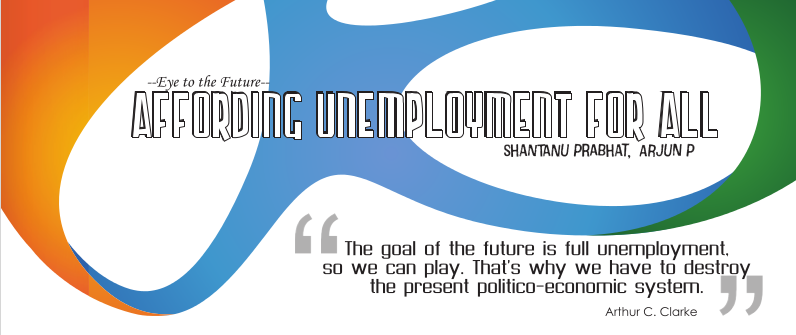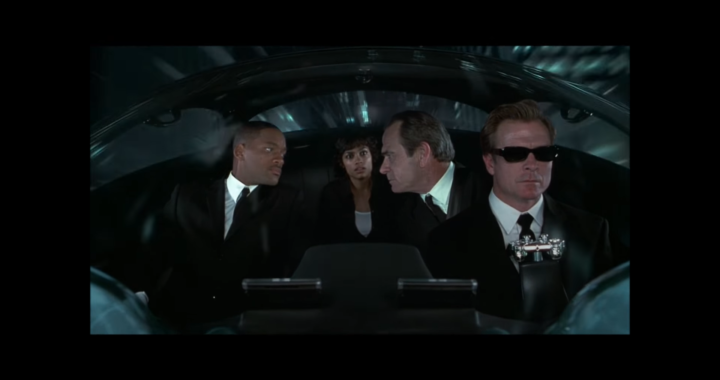Affording Unemployment for All

Shantanu Prabhat, Arjun P
“The goal of the future is full unemployment, so we can play. That’s why we have to destroy the present politico-economic system.”
Arthur C. Clarke
Who doesn’t remember Rosie, the all interactive Robot help of the Jetsons, or the humanoid robots from Asimov’s I, Robot? Every imagination of the future is laced with the compulsory flying cars and an army of robots and intelligent systems at our disposal to do our work. As enthusiasts of science and technology, we are filled with our fair share of enthusiasm, curiosity and wonder. But such a utopian future also begets questions of our role and of the path to get to the future from here.
Considering these ambitions, and looking around at today’s socioeconomic movements, it would be natural for anyone to raise the question: why are people sceptical about the advancements being made in automation technologies? Why do we see people rallying against this leap to the “future”? What really are the differences between these visions, and how do we address the concerns of the people who don’t share the same enthusiasm about these advancements?
Automation is, essentially, that which seeks to eliminate or reduce human effort. This is what we saw with the Industrial revolution and the advent of new manufacturing processes, the steam engine, the machine tools and the factory system. The onset of the last century was also marked by the dawn of Fordism: the great movement towards assembly lines, mass production and lowering costs of production. This was exemplified by Ford Motor’s Model T. And while the subsequent Great Depression did play a huge diminishing role on the collective enthusiasm for machinery, today we seem to have more than come round. Indeed, we have moved far beyond automating only simple repetitive tasks and jobs which do not require much decision making and cognitive capabilities.
McCann, a Japanese ad agency firm, recently hired a robot AI-CD β as a creative director which is set to provide creative direction for commercials. Closer home, Prof. CV Jawahar and his students recently published a paper demonstrating the use of machine learning techniques to teach computers to do text based cricket commentary. Even generally, it is not hard to observe the growing trend of Facebook and several other internet companies employing chatbots as interfaces to communicate with their users.
Not a long time ago, it was predicted that many jobs could not be automated since the corresponding tasks cannot be broken down into a sequence of steps, and involve a high amount of intuition. There was a belief that for such tasks, which involved some know-how or tacit knowledge, the skill could only be acquired from training, in the absence of explicit knowledge. An example of this condition, called Polanyi’s paradox after economic philosopher Michael Polanyi, is driving on the road; as it involves quick reflex to unknown situations, multiple tasks which cannot be predicted beforehand, and the instinct of self preservation coming into play, amongst other things. Nevertheless, 2005 saw the DARPA Grand Challenge for autonomous driving of a car in a deserted road for 212 km, with five vehicles successfully completing the race. Recently, the AlphaGo from Google’s DeepMind division beat the best human player in the game of Go, which had long been considered the hallmark of human intuition. Such examples more than demonstrate our present abilities to cross the Polanyi barrier and automate even cognitive tasks with efficiency.
We are now capable of automating large parts of the work done by paralegals, journalists, support representatives and even drivers: jobs that involve interpersonal interaction, critical thinking, analytical skills, and even some degree of creativity. The Polanyi barrier has been breached, and these skills, which were considered “safe” only a few decades ago, can no longer said to be. One would wonder whether those jobs that Trump wants to take back to the US are even coming back. In fact, manufacturing is already starting to move back to the US from the so-called ‘low wage economies’. But it’s just the work that’s going back — the jobs are gone.
Let’s take a step back and think about the implications of this. In some sense, these developments imply that while we might be creating at least as much product as we were before, we are doing it at significantly lower “cost”. We no longer need humans to spend their time in order to accomplish these basic manufacturing tasks – we can essentially have machines do all of it for us. Normally, this would be looked at negatively, because those who would otherwise be working at the factory would now be “unemployed”. But the same amount of work is still being done! Why are we trying to artificially make humans do work? Is it not the great advantage of technological advancement that humans’ lives are made easier? Why is unemployment bad, again?
A simple answer would be that the idea of employment has always been, for the most part, to earn money. Money means purchasing power. Without work, people lose the ability to buy things. This would be catastrophic not only for the middle and working classes, but also for the rich, because when nobody has purchasing power, who will buy their products?
In the face of mass unemployment, and subsequent loss of sources of income for a vast majority of the population, the idea of a sustenance income is being toyed around with. This is something that the Nordic Countries and Netherland have started fiercely debating now. A sustenance income is an unconditional guaranteed income, given to every citizen, every month – no strings attached. And it is this idea that is commonly referred to as a UBI – a Universal Basic Income.
Prima facie, this might look like a radical idea, something perhaps some socialist hippie might propose. But this idea is neither radical nor new – people from across the political spectrum have proposed versions of this. Richard Nixon, an early ‘small government’ Republican, lobbied for a guaranteed cheque to replace the complex web of social security and bureaucratic welfare system. But that was conditional – determined by whether someone failed to find work, or was unable to work because of disabilities et al. In the 20th century, this was often discussed as paying “social dividends” – paying profits earned from government owned companies back to the public. But this was conditional too – money could only come from ‘public companies’, and nowhere else. Furthermore, if those companies went into loss, the monthly cheque couldn’t come from anywhere.
What is being discussed here is radical in that context, as it is unconditional unlike what we have seen in the past. It does not expect you to be sick or disabled to claim a cheque, and it does not expect the government’s holdings to be in good health to fund that cheque. And it comes in the backdrop of a fear of mass unemployment fueled by large scale automation, robbing people of any scope or chance to work at all.
And all this is not just limited to classroom discussions and academic debates. In 2017, Finland goes for a trial run of UBI for a year. Five to ten thousand Finns will receive 500-700 pounds every month. On the other hand, however, Switzerland recently struck down a referendum with almost 77% of people voting against the idea of implementing a universal basic income. These contrasting events in such close proximity give us some interesting insights. The age of automation is near, and people are slowly realising it. But there aren’t any clear experimentally validated results on how such an economy would look like. Hence, the Finnish response – they would like to do a trial run and see how it pans out.
The Swiss response, however, is even more interesting and poses questions which a lot of our readers might have in mind. The proposal seemed absurd to the Swiss, and when the question was open for referendum, the public response was highly negative – Free cheque! But why?
A common concern is the the fear of de-incentivising work. If people could get paid for no work, then why would anyone work? For many people, the most important drawback of UBI is that it enables free riders. And therefore it is important to introspect where this reverence for work comes from.
Our modern understanding of work and and identity is rooted in a variety of changes that occurred during, or right before, the industrial revolution. The common phrase “work-ethic” comes from a generally loaded term: “Protestant Work Ethic”. Calvinism, and other Protestant reform movements, espoused that it was not only membership and service in the Church that was important for salvation — it was also taking “action” that would ultimately lead to salvation. They had the view that work came with moral and spiritual significance. The profits earned from a business should be reinvested and so on, and it is suspected, by some schools of social and economic history, to be the foundation our of modern day capitalism. Similarly, one could notice how, closer home, the concepts of ‘karma’ and ‘phal’ seem to have been co-opted into this industrial and market interpretation.
But will these ideas still be relevant when development and progress can be delinked from sheer labour? Cynics, like some Swiss leaders and voters among others, say that giving fruit without work devalues the status associated with labour. But a mostly automated future invalidates this status. We shouldn’t worry about whether or not people are working if all required tasks are being done. We should stop seeing wages in a framework of carrots and sticks. Social hierarchies which are now built on how much one makes and how much one spends will have to be reimagined. We are looking at a massive culture shift.
In addition to distributing the purchasing power among members of a community, UBI can also be seen as a unique opportunity to reform our present industrial system towards one that better promotes freedom and liberty. One could even argue that UBI will take society a step forward in ending the artificial sustenance of some industries. The gutka industry, for instance, can be stopped or boycotted without attacking the livelihoods of the people. Similarly, the people manufacturing firecrackers in Sivakasi can get the choice of going for something else without prioritizing their livelihood over their lives. It could also incentivise people to pursue things which would otherwise be monetarily risky, such as the performing arts. A UBI is an investment in people’s ability to take chances without the constraints of survival, and can therefore also be seen as a step to democratize cultural progress and knowledge production.
It could be a step in the direction of freeing people from an identity built around their profession. An increase in work related activities per day has dissolved people’s identities to the tasks they perform. This situation disappears when a person is free to work on what they like, in whatever capacity they like. The industrial labour could be done by the machines, liberating humans from the self imposed drudgery of work allowing them to indulge in creative and explorative endeavours.
—
Eye to the Future is a feature column dedicated to essays and long-form articles on the contemporary and future impact of technology and scientific progress on the society.
Authors – Shantanu Prabhat, Arjun P
Editor – Tushant Jha
Illustrations – Sahiti Chedalavada





 AI Art
AI Art  The Forgotten Century
The Forgotten Century  Autonomous Cars: A Developing Challenge
Autonomous Cars: A Developing Challenge  Understanding Privacy – Case in Point: Aadhaar
Understanding Privacy – Case in Point: Aadhaar  Data and IIIT
Data and IIIT  A perspective on sports in IIIT
A perspective on sports in IIIT  Paintings of IIIT
Paintings of IIIT  The Tale of Jagruti
The Tale of Jagruti  Cleaning up the Mess?
Cleaning up the Mess?
nicely written